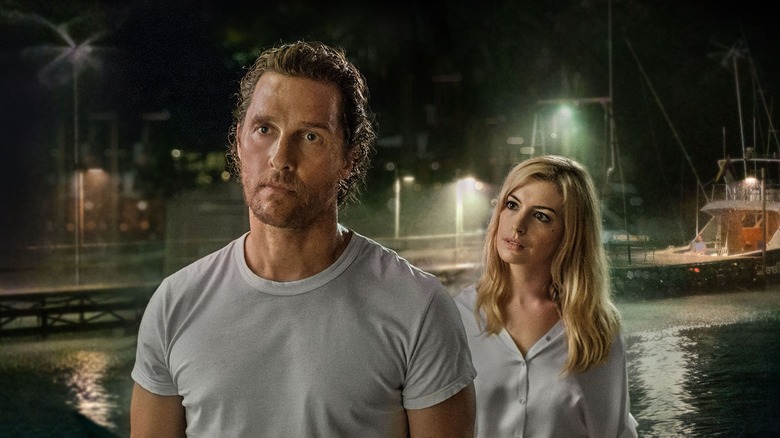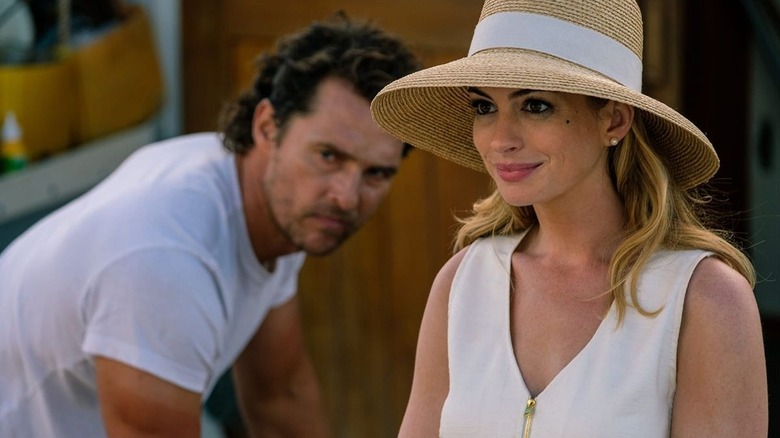A Matthew McConaughey Drama From The Creator Of Peaky Blinders Had A Controversial Production
Do you remember the movie "Serenity?" No, not the film that brought Joss Whedon's science fiction western TV series "Firefly" to a dramatic end. This "Serenity" is a much wilder beast. Written and directed by "Peaky Blinders" creator Steven Knight (we even interviewed him about it here!), "Serenity" stars Matthew McConaughey as a fishing boat captain who is lured into a web of deceit and murder by a femme fatale played by Anne Hathaway. On the surface, the film looks like it's a genre exercise in bringing the classic film noir to the 21st century, echoing many of the genre's staples while transporting its setting to a beautiful tropical island. But lurking under that crystal clear water is a twist that has made "Serenity" infamous as one of the best "WTF am I watching?" movies in recent memory:
Spoiler alert for "Serenity," a 6-year-old movie.
This island is so perfect you might just think it was created in a computer program, and you'd be right. McConaughey's fisherman character sets aside his pursuit of Justice (his name for a giant yellowfin tuna) to pursue a very different kind of justice: killing Anne Hathaway's abusive husband, Jason Clarke. While he prepares for the murder, he's pursued by a clumsy, incompetent businessman played by "Succession" star Jeremy Strong, but he isn't just a businessman. Strong explains that McConaughey isn't actually alive: he's a character in a fishing video game that Hathaway's son has hacked to play out his fantasy of killing his own abusive stepfather.
Turning this horny neo-noir into a video game mashup movie produces one of the wackiest endings of all time, in which McConaughay goes forward with killing the artificial Jason Clarke inside the fishing video game to then inspire the young boy to kill Jason Clarke in real life.
But if you thought that was an overly complicated bit of storytelling, it's nothing compared to the controversy that has been brewing in the tropical island of Mauritius, where the film has become embroiled in a scandal that allegedly goes all the way to the country's former prime minister.
'Serenitygate' alleges that the former prime minister used a film rebate scheme to enrich his own family
Tax incentives are used globally to coax Hollywood film productions to travel halfway around the world to film in these countries, but reporters at the Mauritius news organization Top TV have alleged that the incentives provided to the film "Serenity" went above and beyond what the Prime Minister Pravind Jugnauth had painted them as, in a scandal they named "Serenitygate."
See, the original tax incentive for the country was set to 30% of a film's budget, but when the producers behind the production of "Serenity" approached the government about shooting in their country, they worked with the Prime Minister's brother-in-law Sanjiv Ramdanee to negotiate an upsized 39% rebate through the parliament in a matter of weeks. This also quintupled the Film Promotion Fund's coffers, taking it from 100 million Mauritian Rupees (somewhere in the ballpark of $2 million USD) to 500 million (approximately $10-11 million USD).
Top TV alleges that, while the Prime Minister claimed the increased tax incentives would help seed a new industry of film production for the small island nation of the coast of Madagascar, a hefty chunk of the Film Fund went to the country's tourism industry, in particular the owners of the Maradiva Hotel, which so happens to be owned by ... Sanjiv Ramdanee, the Prime Minister's brother-in-law.
While Jugnauth has maintained his innocence during "Serenitygate," these allegations never spread far beyond the borders of Mauritius. The Top TV video that brought this "Serenitygate" to life went online in 2019 and was allegedly removed from Facebook in what Top TV calls a violation of their freedom of expression.
With Christopher Nolan's "The Odyssey" adaptation falling into its own hot water for shooting in Moroccan-occupied Dakhla, this is all a necessary reminder that the film business can have real political impacts on the locales it touches.

